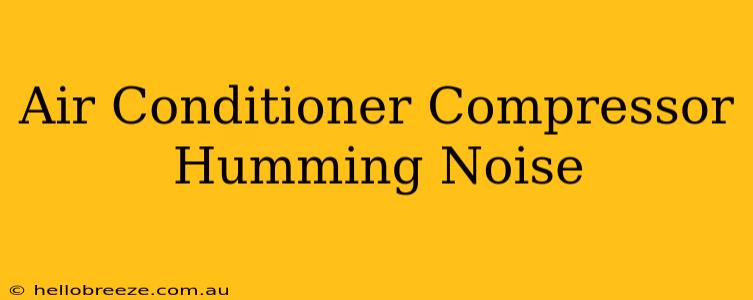Is your air conditioner making a humming noise? A humming sound emanating from your AC compressor can be a sign of several issues, ranging from minor inconveniences to serious problems requiring professional attention. This guide will help you diagnose the cause of the humming and offer solutions to get your AC back to its cool, quiet self.
Identifying the Source of the Hum
Before jumping to conclusions, it's crucial to pinpoint the exact source of the humming noise. Is it coming from the compressor unit outside, or is it an internal sound within your home? Knowing this will narrow down the potential causes significantly.
Outside Unit (Compressor):
- Loose Parts: A common cause is loose parts within the compressor unit itself. Vibrations from the motor can cause these parts to rattle and hum.
- Worn Bearings: The compressor uses bearings to facilitate smooth operation. Worn or damaged bearings are a frequent culprit behind humming noises. This is a serious issue that needs professional repair.
- Refrigerant Issues: Low refrigerant levels can cause the compressor to work harder, potentially leading to a humming sound. A leak in the system might also be responsible. Again, this is a job for an HVAC technician.
- Electrical Problems: Issues with the electrical components, such as the capacitor or motor windings, can cause unusual humming or buzzing sounds.
Inside Unit (Evaporator Coil):
- Fan Motor: While less common, a failing fan motor within the indoor unit can sometimes produce a humming noise. This might be accompanied by reduced airflow.
- Airflow Restrictions: Blockages in the air vents or dirty air filters can restrict airflow, forcing the system to work harder and potentially producing unusual sounds.
Troubleshooting Steps for a Humming AC Compressor
If the humming is coming from the outdoor compressor unit, try these troubleshooting steps:
-
Check for Obstructions: Ensure nothing is obstructing the airflow around the outdoor unit. Clear away any debris, leaves, or overgrown vegetation. Proper airflow is crucial for efficient operation.
-
Inspect for Loose Parts: Carefully inspect the unit for any loose parts that might be vibrating. If you find anything loose, tighten it securely (but only if you are comfortable working with electrical appliances; otherwise, call a professional).
-
Listen Carefully: Try to pinpoint the exact location of the hum. This can provide valuable clues about the source of the problem.
When to Call a Professional
While some minor issues might be resolved with simple troubleshooting, it's crucial to understand your limitations. If you are uncomfortable working with electrical appliances or suspect a more serious problem, call a qualified HVAC technician immediately. Ignoring issues like low refrigerant or worn bearings can lead to significant damage and expensive repairs down the line. Here are some situations that warrant a professional's intervention:
- Persistent Humming: A continuous humming noise is a clear indication that something is amiss.
- Unusual Vibrations: Excessive vibration along with the humming sound suggests a more serious mechanical problem.
- Reduced Cooling Capacity: If your AC is not cooling efficiently, there might be a more significant underlying issue.
- Unusual Smells: Any unusual smells emanating from the unit, such as burning plastic or electrical odors, are warning signs requiring immediate attention.
Preventing Future Humming Problems
Regular maintenance is key to preventing humming and other AC problems. Schedule annual inspections and maintenance by a qualified HVAC technician. This includes:
- Cleaning the coils: Keeping the coils clean and free of debris improves efficiency and reduces strain on the compressor.
- Checking refrigerant levels: Low refrigerant is a common cause of numerous problems, including humming.
- Lubricating moving parts: Proper lubrication helps prevent wear and tear.
- Replacing air filters: Regularly replacing your air filters prevents restricted airflow and improves overall system performance.
By carefully following these steps and paying attention to the sounds your AC is making, you can effectively diagnose and resolve a humming compressor issue, ensuring a cool and comfortable home all summer long. Remember, prevention is always better than cure – regular maintenance is your best defense against costly repairs.

